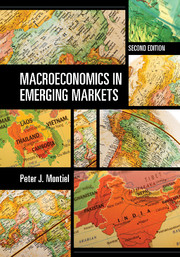Book contents
- Frontmatter
- Contents
- Preface
- PART 1 THE MACROECONOMIC FRAMEWORK
- PART 2 A BENCHMARK MACROECONOMIC MODEL
- PART 3 PUBLIC FINANCE AND MACROECONOMIC PERFORMANCE
- PART 4 MONETARY INSTITUTIONS AND MONETARY POLICY
- PART 5 EXCHANGE RATE MANAGEMENT
- PART 6 THE FINANCIAL SECTOR AND MACROECONOMIC PERFORMANCE
- 20 Finance, Welfare, and Growth
- 21 Financial Repression
- 22 Financial Reform
- 23 The Benchmark Model with Banks
- 24 Coping with Capital Inflows
- PART 7 VARIETIES OF EMERGING-MARKET CRISES
- Index
- References
22 - Financial Reform
Published online by Cambridge University Press: 05 June 2012
- Frontmatter
- Contents
- Preface
- PART 1 THE MACROECONOMIC FRAMEWORK
- PART 2 A BENCHMARK MACROECONOMIC MODEL
- PART 3 PUBLIC FINANCE AND MACROECONOMIC PERFORMANCE
- PART 4 MONETARY INSTITUTIONS AND MONETARY POLICY
- PART 5 EXCHANGE RATE MANAGEMENT
- PART 6 THE FINANCIAL SECTOR AND MACROECONOMIC PERFORMANCE
- 20 Finance, Welfare, and Growth
- 21 Financial Repression
- 22 Financial Reform
- 23 The Benchmark Model with Banks
- 24 Coping with Capital Inflows
- PART 7 VARIETIES OF EMERGING-MARKET CRISES
- Index
- References
Summary
A natural response to the recognition of the adverse consequences that financial repression can have for growth is to attempt to undo these harmful policies. Because these policies take the form of restrictions on financial intermediation, their removal is referred to as financial liberalization. Many emerging and developing economies have indeed embarked on such a path over the past two decades. But if these restrictions are removed, the question arises of what – if anything – to replace them with. Should the government simply adopt a hands-off approach to the financial sector, or are there specific government policies that may enhance, rather than inhibit, the efficiency of financial intermediation?
It turns out that simply removing the harmful policies associated with financial repression overnight and adopting a laissez-faire approach toward the financial system may do more harm than good. In particular, it may generate new kinds of resource misallocations and may result in severe financial crises with important macroeconomic implications. As we saw in Chapter 20, credit-market imperfections create a role for public policy in a well-functioning financial system. The problem with financial repression is not so much the fact of public-sector involvement in regulating the financial sector as it is the type of public-sector involvement. Because what is required is a redefinition of the government's role, rather than the removal of any role for the government, a better term for the process of moving from a repressed financial system to a well-functioning one is financial reform rather than liberalization.
- Type
- Chapter
- Information
- Macroeconomics in Emerging Markets , pp. 525 - 557Publisher: Cambridge University PressPrint publication year: 2011



